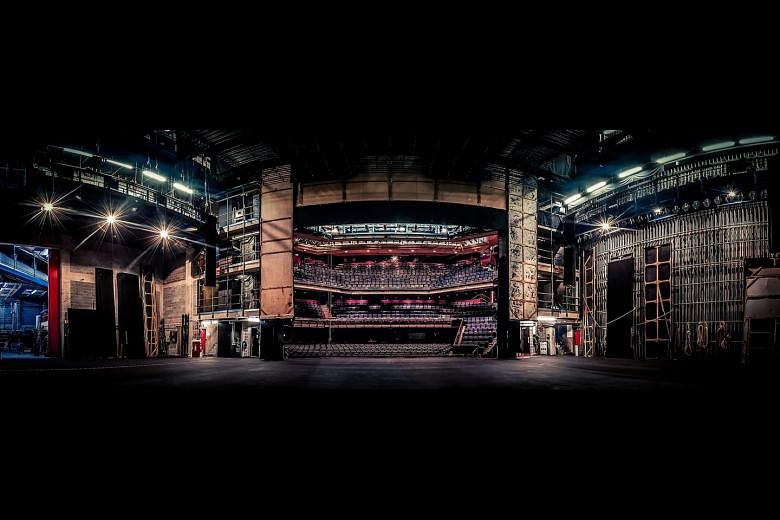LONDON • Mr Adrian Vinken, chief executive officer of the Theatre Royal in Plymouth, England, steeled himself on June 22, then loaded up Zoom.
About 240 of the theatre's staff members were waiting online, he recalled in a telephone interview.
Those included "people who'd worked for us for 30 years and given us everything", Mr Vinken said, as well as young workers who had only recently nabbed a job at the three-stage venue, one of Britain's largest outside London.
He then said almost a third of the theatre's jobs were at risk and that many employees would soon be laid off. With the theatre closed because of the coronavirus pandemic, it had lost more than 90 per cent of its income.
"It hurt like hell," Mr Vinken said. For weeks, prominent actors, including Phoebe Waller-Bridge and Judi Dench, had been warning the government that Britain's cultural venues were at risk of collapse unless it threw them a lifeline.
On June 25, it seemed as if help might come. That evening, Mr Oliver Dowden, Britain's culture secretary, announced a road map to reopen performing arts venues. The plan set out five stages, eventually including indoor shows with limited audiences, then, later, larger crowds.
But disappointment soon set in when Mr Dowden gave no target dates or promises of financial aid. Soon after the announcement, it was being mocked on social media.
"It was an entirely pointless exercise," Mr Vinken said.
Britain's cultural sector increasingly stands alone in Europe. It has been the slowest to reopen after a lockdown, for a start.
Museums in Britain can reopen starting from yesterday, although most will return gradually over the next few months. Some theatrical performances and concerts have also been announced for the summer, but only as drive-in events.
On the continent, museums have been open for weeks, orchestras are performing again and theatres are announcing their coming seasons, albeit in venues with social distancing. In France, Germany, Italy or Belgium, where the arts are heavily subsidised by the state, performing companies and museums can survive with reduced ticket sales. But in Britain, where government funding is much lower and organisations rely on commercial income, most are unprepared for a future in which they can admit only a fraction of their usual audience.
As in many European countries, workers in Britain's culture sector are covered by economy-wide job protection programmes. But, so far, the government in Britain has yet to announce a specific rescue package for the arts.
For months, Britain's cultural stars - from conductor Simon Rattle to the organisers of the Glastonbury music festival - have been arguing and, at times, almost begging for action from the government. Acting in a coordinated media campaign, actors and theatres have called for the government's job-retention programme, in which it pays about 80 per cent of furloughed workers' wages, to be extended until venues can reopen without social distancing.
As a backup, they are calling for a huge government-loan programme to help them stage work in half-empty halls.
In a statement dated June 19, endorsed by some of the most prominent British names in classical music, Rattle said: "We really, really do not want to be left behind here and have our world-class industry fall by the wayside, while European cultural institutions are being protected."
A spokesman for Britain's Culture Ministry said: "We are working with the sector to get it fully back up and running as soon as possible." She declined to answer a list of questions.
What institutions need now is money to prevent "catastrophic" layoffs, said Ms Tamara Rojo, artistic director of the English National Ballet and a member of the Cultural Renewal Task Force. However, the committee had not been discussing financial support she said.
Mr Dowden has repeatedly promised that a rescue package is coming. "I am not going to stand by and see our world-leading position in arts and culture destroyed," he said in an interview with The Evening Standard newspaper on June 8. But how much the government allocates is out of his hands. It will depend on finance minister Rishi Sunak - known as a Star Wars fan, but not an arts aficionado - and, ultimately, Prime Minister Boris Johnson.
On June 24, The Financial Times reported that the prime minister's office was working on a rescue package, but quoted unnamed sources who said it was "not imminent" and "likely to be on a significantly smaller scale" than requested. But many remain hopeful something will emerge.
Mr Nicholas Hytner, a former artistic director of the National Theatre, said in an e-mail: "Although it's taken much longer than it's taken in Germany, I believe that there will be a big rescue package here and I believe it will happen soon."
He added that the government understands that Britain's cultural institutions are an economic success story - generating more in taxes than they take and drawing tourists to the country.
NEW YORK TIMES

